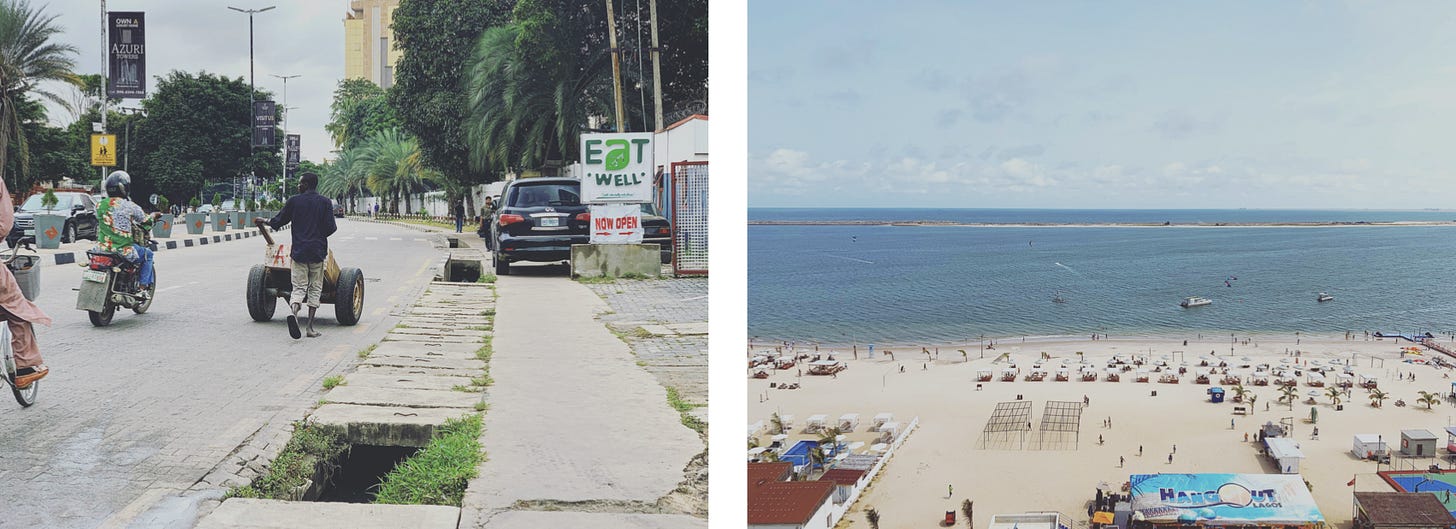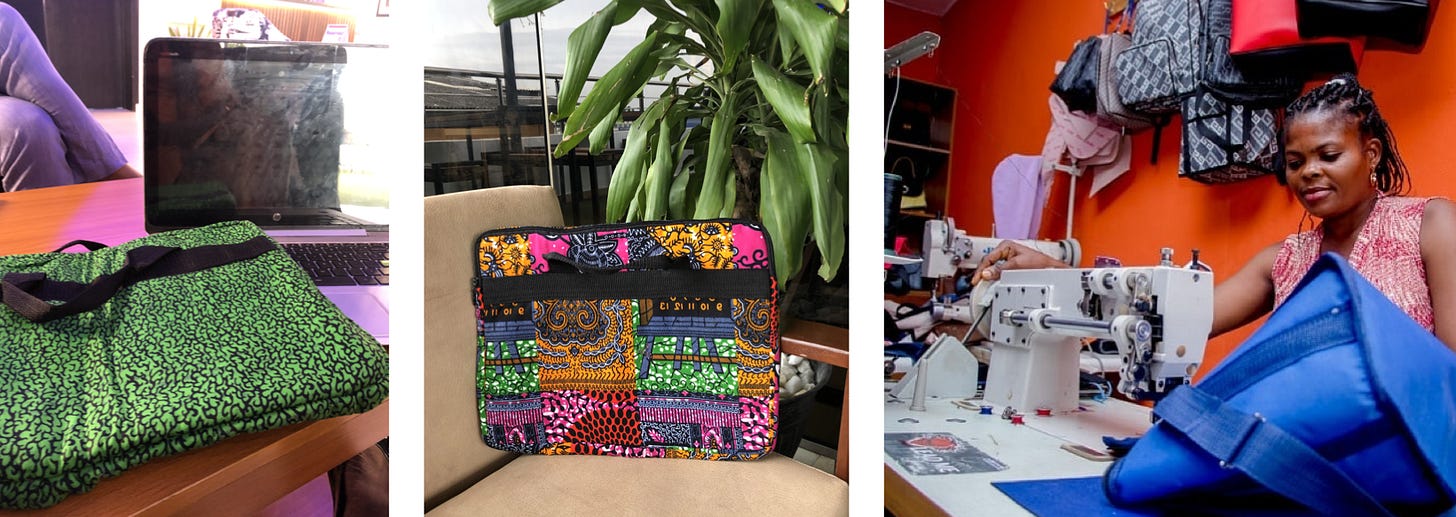Covering topics from urban mobility and architecture to interior design and dream homes, a newsletter that reminds us where we are matters.
Happy fall! 🍁
It’s starting to get festive here in New York as we approach the holidays.
Recently, I was fortunate to have had a chance to visit Nigeria, the giant of Africa. Through working on a project in this country, I was able to get to know more intimately its people and culture.
Here, I wanted to share some of my observations. With regards to the city of Lagos, it is not perfect; it is inundated with issues including infrastructure and governance. Yet its people, their relentless drive and ambition, will make a difference in building towards a better future.
Feel free to respond to this email directly or via @cocobliu. I look forward to any thoughts!
“What do you like about Lagos?” I asked the Uber driver.
“There are so many opportunities here. Everyone comes to Lagos and makes it. You can make a living selling anything.” She replied, radiating a sense of pride for her country.
You can make a living selling anything. During traffic, people hustle between the lanes with food, snacks, drinks, even books, rain or shine.
On Geography
I took a walk on Victoria Island on my first day in Lagos. VI is known as Lagos’s commercial center with many restaurants and entertainment options. However, as I wandered around the neighborhood, it was a challenge to find them.
Later I discovered the prevalence of gated communities in Lagos. For the purpose of security or a sense of exclusivity, the shiniest restaurants and hotels are often hidden behind the gates. Trips are destination-driven as opposed to stumbled-upon. The idea of “life on the sidewalk” appears to be a foreign and outdated concept. Environments tend to make us feel and behave a certain way. Do the gates and security guards make the communities feel safer, or do they leave the city with a sense of distance?
Furthermore, far from being a walkable city, Lagos lacks adequate transit infrastructure and is overwhelmed by sprawl. The layout of a city determines one’s way of life. In some respects, Lagos has the lifestyle of massive suburbia, where every destination is rather dispersed and reached only by car.
Lagos felt like massive suburbia with gated communities. What is behind the gates is the shinny, what is outside of the gates is more real.
On Infrastructure
In addition to inefficient road networks and constant traffic, there are many uncovered drainages on the streets. Based on conversations with locals, I learned that roads belong to the government and that there is little incentive for authorities to spend resources building better infrastructure. Thus, people resort to gated communities to isolate themselves from failed government nuisance.
Corruption prevails. The budget allocated for infrastructure disappears at various levels of governance. The small sum that is left leaves the city with substandard infrastructure with hefty annual maintenance fees. Immediate revenue and personal interest are valued above the long-term prosperity of the city and building for a better life becomes an afterthought. The tragedy of the commons is felt on a national level.
Sometimes, private developers would take the responsibility to provide infrastructure where the government has failed in order to sell their properties. Landmark, for example, build the access road leading to its development.
Left: streets of Victoria Island (VI); Right: Landmark Beach
On Culture
A large part of the culture in Lagos seems to be driven by a pursuit of ostentatious luxury, sacrificing authenticity. Ego tends to prevent Nigerians from taking public transit or riding a bike even if the options are available. Luxurious estates are built, while historical buildings are demolished.[1]
A culture that is in danger of an eventual demise is the vulnerable community Makoko. Makoko is one of the most fascinating places I’ve visited during this trip. Known as the “Venice of Lagos”, it is a community established based on the proximity to water. Houses on the water are supported by wood stilts driven deep into the waterbed. They make a living via fishing, sawmills, and firewood.
I took a boat tour from a local to experience the enchanting way of water transport along with a brief glimpse of their way of life. Despite lacking in resources, Makoko is rich in culture. They remind me of Cần Thơ Floating Market in the Mekong River Delta in Vietnam and Feng Huang in China. What the authorities do not realize, is the potential of these communities to develop into something more—heritage sites that preserve a special way of life, along with tourism potential.
Life on the water in Makoko.
I met a friend who built a school in Makoko. She’s teaching children to make beautiful laptop cases to sell. Here is more info if you’re interested in purchasing!
Despite a desire for luxury, when you ask many locals where their favorite place is, it is neighborhoods like Surulere, full of character and life. It is a place where one can stumble upon the best street foods. As a local put it, “the island is show off, while the mainland is more real”.
The tunes of Surulere — WIZKID - OJUELEGBA
On People
Infrastructure is subpar; power goes in and out multiple times a day. The system is not functional. Yet, many Nigerians love their country deeply. Instead of moving away in pursuit of a better life, they choose to stay and work on improving their country.
When people talk about Africa, many subscribe to the notion that “Africa needs help.” However, for the continent to thrive, it cannot rely on help from the outside; it has to find a way from within. Its future lies in the hands of the next generation who are ready to build.
In Nigeria, I see resemblances to my home. It is a place with unrealized potential, powered by skilled talent hungry for growth. The difference between Nigeria and China is that China historically relies on a strong center.[2] In China, a powerful central government drives change; while for Nigeria to thrive, it relies on its people.
—
Through working with Iyin Aboyeji, a Nigerian tech entrepreneur who built two unicorns, I saw the ambition and the work ethic of the people.
He could’ve retired into the hills of Napa Valley; perhaps there is a better life elsewhere with bigger shopping malls, nicer amenities, more organized streets. But Iyin chooses to stay. Because in Lagos, there are opportunities for change.
“People think I have a lot of choices on where to live. I really don’t. You’re always closest to the things you build.”
It’s this unwavering love for his country.
—
Shameless plug, we’re building Talent City Lagos, an enabling environment for talents to build.
Oga, thanks for showing this oyinbo around.[3]










As a full time Lagosian with experience visiting different countries, it is always nice seeing Lagos through the eyes of a newbie. On thing I must warn you about Lagos tho, amidst the failing government and infrastructure, the city the people and the culture resonates with you. Lagos is love. I am glad you had a lovely time in Lagos. Lagos is a city with the potential to become what ever we want it to be. Talent city is going to redefining living in Lagos. I am excited to about this. Visit Lagos soon again!!